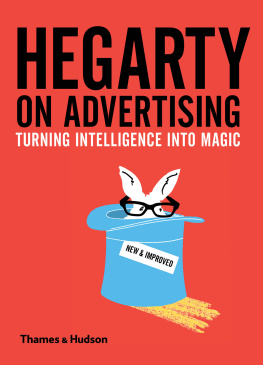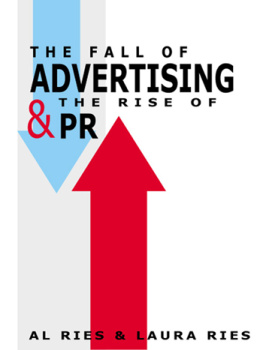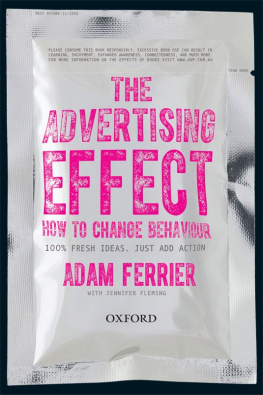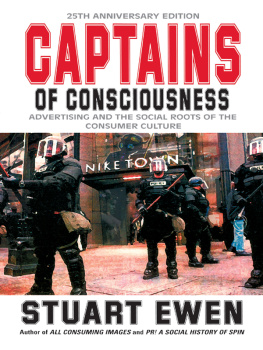SELLING UNDER THE
Swastika
ADVERTISING AND COMMERCIAL CULTURE IN NAZI GERMANY
Pamela E. Swett
STANFORD UNIVERSITY PRESS
Stanford, California
Stanford University Press
Stanford, California
2014 by the Board of Trustees of the Leland Stanford Junior University
All rights reserved
No part of this book may be reproduced or transmitted in any form or by any means, electronic or mechanical, including photocopying and recording, or in any information storage or retrieval system without the prior written permission of Stanford University Press.
Library of Congress Cataloging-in-Publication Data
Swett, Pamela E., author.
Selling under the swastika : advertising and commercial culture in Nazi Germany / Pamela E. Swett.
pages cm.
Includes bibliographical references and index.
ISBN 978-0-8047-7355-3 (cloth : alk. paper)
1. AdvertisingGermanyHistory20th century. 2. AdvertisingPolitical aspectsGermanyHistory20th century. 3. GermanyHistory19331945. I. Title.
HF5813.G4S94 2013
659.10943'09043dc23
2013021445
ISBN 978-0-8047-8883-0 (electronic)
Printed in the United States of America on acid-free, archival-quality paper
Typeset at Stanford University Press in 10/13 Galliard
For Matt
Yb
Acknowledgments
Throughout the research and writing of this book, I have often looked forward to this moment. It is very satisfying to be able to thank all those who helped me arrive at this point. Let me begin with the institutions and individuals that made the research possible. The John W. Kluge Center at the Library of Congress was the first institution to support this project; I am particularly grateful for their early interest. The Social Science and Humanities Research Council of Canada provided me with three years of research funding, including one term of teaching release. This generous grant covered numerous forays into the archives and provided some uninterrupted time to write, a precious commodity indeed. The Alexander von Humboldt Foundation also provided welcome funds for two research stays in Germany and should be commended for recognizing the desire of scholars to have their families with them while abroad. Among the many archivists who helped push this project toward completion, special thanks are owed to Petra Secunde (Daimler), Sonja Nilson (Henkel), Thorsten Finke (Beiersdorf), and Birgit Nachtwey (Bahlsen). Dr. Henrich Hunke was also kind enough to welcome me into his home and share his personal collection of his fathers writings. I very much appreciated his openness and hospitality. McMaster University, my institutional home, and its Arts Research Board also deserve thanks for supporting this project financially as well as for offering a stimulating environment in which to work. Not least of the perks of being on faculty at McMaster is the ability to access the McMaster Childrens Centre. The staff at the Centre has been a part of my familys life for more than a decade and has contributed in important ways to any success I have enjoyed.
Thanks also goes to those who invited me to present my research over the last few years, including Hartmut Berghoff of the German Historical Institute, Washington, DC; Peter C. Caldwell of Rice University; Till van Rahden, Universit de Montreal; Thomas Schaarschmidt of the Zentrum fr Zeithistorische Forschung, Potsdam; and Annette Timm, University of Calgary. My editor at Stanford, Norris Pope, was patient while I wrote and a pleasure to work with through the production process. The two reviewers for the press were equally collegial and suggested improvements that I readily incorporated. Tim Mueller, Katrina Espanol-Miller, and Gerulf Hirt provided me with some key technical assistance down the stretch. I thank them for their help. Wendy Benedetti and Debbie Lobban also deserve mention for their administrative skills, without which my job as department chair would be much more time consuming.
I also owe much to those friends and colleagues whose wise counsel and timely pep talks were instrumental in the completion of the project. At McMaster, Stephen Heathorn and Martin Horn have been trusted friends for many years and came to my rescue in a variety of ways during the writing of this book. I am grateful to Justin Powell, who continues to provide me a most welcoming home in Berlin. In addition, I must also thank Richard Bessel, Belinda Davis, Peter Fritzsche, Jeff Hayton, Claudia Koonz, Lisa Heineman, and Jonathan Wiesen for their input in discussions of this material. My deepest gratitude goes to those who read whole sections of the manuscript: Frank Biess, Paul Lerner, Corey Ross, and Jonathan Zatlin. Their criticism and enthusiasm were invaluable. In the final inning H. V. Nelles willingly stepped up to the plate and read the entire book. I am very lucky to know so many generous scholars.
Lastly, I thank my family. My boys, Jack, Nathaniel, and Paul, to my continued bewilderment show an interest in my work that reminds me on a daily basis of the connections between historical scholarship, teaching, and a healthy civil society. Happily, my husband, Matt Leighninger, looks forward to time in Berlins Staatsbibliothek as much as I do. He was probably less excited to edit this manuscript, but he did so willingly nonetheless. I dedicate this book to him.
Contents
Illustrations
Abbreviations
The following abbreviations are used in the text:
AFE
Working Association for the Advancement of the Electric-Economy
BFC
Bhme Fettchemie
BIZ
Berliner Illustrierte Zeitung
DAF
German Labor Front
DRV
German Advertising Association
DW
Die Deutsche Werbung
GfK
Society for Consumer Research
JWT
J. Walter Thompson Advertising Agency
NSDAP
National Socialist Party of Germany
NSRDW
National Socialist Reich Association of German Advertisers
RMVP
Reich Ministry for the Peoples Enlightenment and Propaganda
RVA
Reich Board for Economic Enlightenment
Sopade
Social Democratic Party of Germany in Exile
Werberat
Ad Council for the German Economy
Introduction
It serves nothing to depend on past economic forms and social relationships. If we, as a people, do not want to decline, we must become comfortable with the new and emerging world. Advertising is a language of this world.
This plea, made in 1929, neatly encapsulates the starting point for this book. It comes from the pen of Hans Luther, the deliberately party-less, former chancellor of the Weimar Republic and soon-to-be head of the Reichsbank and ambassador to the United States until 1937. Typical of his entire political career, which included roles in the republic, Nazi dictatorship, and the early Federal Republic, this statement is one that encourages adaptation. The details of how Germans were to become comfortable with the new and emerging world and what that world might look like were yet to be determined. What was certain, according to Luther, was that advertising would be a key component of this emerging world, a medium for participating in this transformative process. Men and women working in ads-related jobs certainly welcomed the social and economic significance attributed to their work. Others were more wary of any world in which advertising was to be a central form of expression, and yet even they agreed that the modern advertisementat once arresting in form or content and banal in its ubiquitous presencewas here to stay.
This book takes Luthers entreaty seriously by examining what advertising in the two decades following this statement can tell us about the ways Germans came to terms with the new and emerging world. This process was not a passive one: individuals in a variety of fields championed their own visions of reform or revolution in Germany after the First World War; after 1933 Nazi ideologues and supporters began to implement their utopian blueprint; and the victorious Allies entered the stage with new ideals and plans in 1945. With its focus on the Third Reich, this book attempts on one level to tease out the complex relationships between corporations and the regime. These relationships were not equal, but neither was the power of the dictatorship absolute. Rather a bounded relative autonomy characterized the relationship between the National Socialist regime and the commercial sector, including the aspiring advertising profession in the 1930s. Bounded because the regime set certain non-negotiable parameters: anti-Semitic, nationalist, and regenerative, which ad professionals accepted largely without complaint. Relatively autonomous in the sense that both parties wished to maintain a degree of separation, recognized some mutuality of interest, and preferred self-discipline to command and control.
Next page









